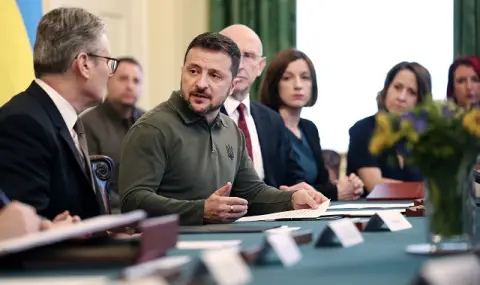Peace talks in Ukraine are gaining momentum. Munich was the first place where the US began to discuss ending the war against Ukraine. Is there a ready-made plan? Not completely. But many things have become clearer.
Next week, US Secretary of State Marco Rubio will discuss options for ending the war in Ukraine in Saudi Arabia together with high-ranking Russian representatives. In addition, a meeting between US President Donald Trump and Russian President Vladimir Putin will be prepared in the Arab country. European heads of state and government are also expected to meet at a special summit in Paris next week.
Europe's concerns
They fear that Europe could be excluded from the peace talks between the United States and Russia. According to “Politico“, no European representative will participate in the talks in Saudi Arabia next week. Ukraine will also not send its representatives there, the American magazine reports, citing a Ukrainian official.
At the Munich Security Conference, the US special envoy for Ukraine, Keith Kellogg, gave an evasive response to the request of European allies to participate in the talks. Previous talks had failed because too many countries participated, the British television BBC quoted him as saying. Ukraine and the EU countries insist that they must be at the negotiating table in the search for a peaceful solution.
For Volodymyr Zelensky, Munich is the city where in February 2022 Western leaders were anxiously discussing the situation surrounding Russia's looming war against Ukraine. At the then Munich Security Conference, however, few believed that such a thing was possible, just as they did not believe that Ukraine would withstand a Russian strike. Three years later, the main topic of the Munich forum was the plan to end the war proposed by the new US President Donald Trump, who set a course for rapid negotiations with Russian President Vladimir Putin.
Zelensky's "Red Line"
At the end of the first two days, the question - at what price is peace possible - remained without a clear answer. Will the price be Ukraine's refusal to join NATO and from the territories occupied by Russia, as Moscow insists and as the new Pentagon chief Pete Hegseth announced on the eve of Munich? Vice President J.D. Vance said almost nothing on the subject, and Trump's special envoy for Ukraine and Russia, retired General Keith Kellogg, also failed to provide specifics, except to say that Washington wants a long and stable peace in Ukraine. But the plan is clearly not fully ready, and the Ukrainian leader will discuss the topic during his next meeting with the head of the White House, probably in Washington. It is not known when it will take place.
In Munich, Zelensky made it clear that he does not accept the role of an extra in Trump's scenario. "Ukraine will never accept deals made behind our backs and without our participation," the Ukrainian president said on February 15. The hall of the "Bayrisher Hof" hotel, where the conference is being held, reacted with applause.
A day earlier, Zelensky said that he would go to talks with his Russian counterpart Vladimir Putin only after coordinating his positions with the United States and the European Union. Zelensky made it clear that Europe should be at the negotiating table in any peace talks between his country and Russia. Europe, the United States and Ukraine should coordinate a unified defense and security strategy with a clear plan of action before any negotiations, he said.
What Washington expects from Ukraine
The Europeans are insisting on being invited to the future negotiating table, but the Americans are in no hurry to invite them. The conditions for participation in the negotiations with Putin are not the only “red line” that Zelensky outlined in the Bavarian capital. In Munich, the Ukrainian president refused to sign a draft agreement on US access to rare earth deposits.
According to publications in the American press, Washington wants access to half of these Ukrainian reserves in exchange for continued military aid to Kiev. In principle, Ukraine is not against it, but the details have yet to be agreed upon.
Ukraine has been defending itself against Russian invasion for almost three years with the help of the West. Russia controls about a fifth of Ukraine's territory, including the Black Sea peninsula of Crimea, which it annexed in 2014.
What concessions does the US expect from Russia?
The Munich conference featured chaotic and inconsistent statements by US representatives on the Ukraine issue. Zelensky spoke about it with ill-concealed irritation. The Ukrainian president said that there were "different voices" in the new US administration and he was "not sure" that "all of them are on the side" of Ukraine. Zelensky did not specify which ones he meant.
While there is increasing talk of possible concessions to Ukraine, it remains almost unclear what kind of compromise Trump wants from Russia. Answering a question during the DW "Conflict Zone" discussion in Munich, Kellogg said that, as in the case of Ukraine, the US could also demand "territorial concessions" from Russia. In the same context, Kellogg mentioned sanctions, including against Russia's "shadow fleet," which the West says helps Moscow illegally export oil.
"This is not good news for Kiev"
What is the main result of Munich for Ukraine? "We should not lose hope, no one gave Ukraine to Russia", British political scientist Mark Galeotti told DW. "But the main thing about this Munich conference is that usually here we talk about the unity of the West, and in this case we are dealing with the disunity of the West. This cannot be good news for Kiev," he added.
